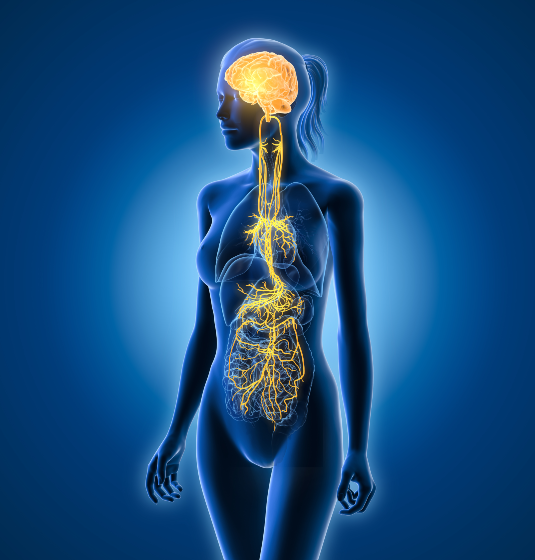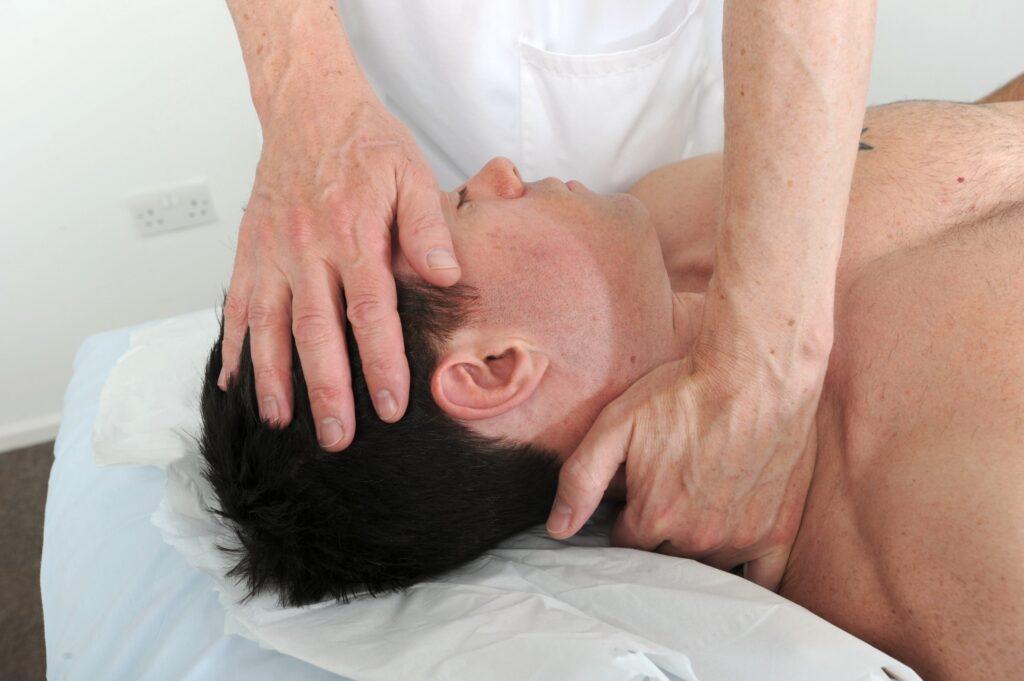The Vagus Nerve
If you read healthcare articles, you’ll have seen a few talking about the Vagus nerve (a.k.a The Depressor nerve). They normally talk about how you need to stimulate it to relax yourself. You may even have come across it mentioned on your social media feed.
This picture outlines the Vagus Nerve pathways, showing how it innervates the organs of digestion, breathing, circulation and excretion.
Its actions also help to promote a better regulated immune response as well as leading to relaxation, so affecting mood.

Where Is The Vagus Nerve?
The Vagus nerve travels from its nucleus in the brain stem through the skull, the neck, the chest and into the abdomen. ‘Vagus’ literally means ‘wandering’ and has a branch on the left and right side of the body.
The Vagus nerve provides balance to a part of the nervous system known as the Autonomic Nervous System (ANS). We all have an ANS and it has two parts, the Sympathetic (SNS) and Parasympathetic (PSNS) parts. The Vagus nerve is the main part of the PSNS.
The Vagus Nerve’s Purpose
The SNS and PSNS act as opposing forces, in an attempt to create balance in our body’s physiology. Their actions speed up and calm down (respectively) bodily functions that you don’t consciously control. In order for balance to occur, Vagal tone has to equal Sympathetic tone. Therefore PSNS will need to equal SNS tone.
In reality, your Autonomic nervous system is always in a state of flux and varies wildly depending upon your body’s needs.

These needs include varying your heart rate, blood circulation, oxygen exchange (our ability to breathe), digestion and excretion.
This means (for example) that our body can increase it’s heart rate by increasing SNS and decreasing PSNS in times of need. Examples of this might include having to run to catch a bus, or when you become excited about an adventure.
What Negatively Affects Vagus Nerve Function?
Physical and emotional stress
“Decreased Vagal tone” can be caused by physical and emotional stressors and is the most common cause seen by us in our surgery.
With both of these causes, the root of the problem lays with the amount of inflammation in the body, leading to destruction of and irritation of the body’s tissues. Inflammation can come from a variety of sources.
Physical stresses
Physical stresses can include all manner of micro and macro trauma.
Micro trauma includes simple strains such as postural fatigue, gardening or repetitive strain injuries you may get from work. It will also include degenerative changes to joints, such as Arthritis, which is a problem for millions worldwide.
Major traumas are more like the traumas seen in sports injuries and road traffic collisions. Both types of trauma can be acute or chronic.
Acute trauma, is a recent trauma which you feel acutely, is very painful and nothing seems to make it feel better.
Chronic trauma is usually from events that have built up over time, or that happened a long time ago with long lasting effects including nagging aches and pains.

Whichever type of trauma, you will notice it as being a source of aching or pain in your body.
At Baks, we use Osteopathy, Cranio Sacral Therapy and Acupuncture to not only deal with pain related issues, but in doing so we stimulate the Vagus nerve and so bring you to a state of relaxation.
Emotional stresses
Emotional stresses that are low grade (most common type), such as chronic work stresses, can commonly decrease Vagus nerve function.
You may notice this as feeling more stressed, anxious, depressed, angry and/or fatigued. Physically, you may notice neck or back tension, a physical problem which may be enough to bother you. It may also seem to be purely physical, without you suspecting an emotional component at all.

Less commonly, higher level stresses can also reduce Vagus nerve function.
Higher level stresses are not for physical therapy to help with on their own. At Baks, it’s difficult to help deeply held traumas such as childhood trauma or Post Traumatic Stress Disorder (PTSD) without you first seeing a mental health practitioner. These sorts of stresses would benefit from assessment by a mental health practitioner to decide what would work best for you.
After you have started treatment for your deeply held trauma, then it may be appropriate to include a physical therapy such as Craniosacral Therapy or Acupuncture, to supplement the advice given by a mental health practitioner.
Whatever your reasons for having reduced Vagal tone, each treatment we provide is tailored specifically to you, with individual treatment aims. Relaxing muscles and joints, thereby reducing the SNS and allowing the PSNS (Vagus nerve included) to function better is key.
Inflammation
Inflammation can be caused by aforementioned physical and emotional stresses, but also by a number of other causes, including:
- Diabetes – affects arterial function, so affecting the blood to the Vagus nerve
- Infection – COVID19 is associated with Dysautonomia which is a condition that affects your ANS in a negative way
- Surgical – direct incision into the Vagus nerve
- Scleroderma – a hardening of connective tissue which effectively strangles the Vagus nerve and corrupts its blood supply and drainage
Whichever cause of inflammation there is, the end result of it depends upon how long it is allowed to persist for.

Chronic inflammation can be responsible for diseases of the mind, the intestines and many other stress induced pathologies.
Vagus Nerve Stimulation
Typically, doctors prescribe medications to combat inflammation. However, there’s growing evidence that another way to combat inflammation is by engaging the vagus nerve and improving “vagal tone.”
Stimulating the vagus nerve (increasing Vagal tone) reduces inflammation and the symptoms of arthritis and a higher vagal tone index is linked to physical and psychological well-being. Stimulating the vagus nerve can offer some people advantages over the use of drugs, such as lower costs and fewer side effects.
The Importance Of Allowing Yourself To Relax
The Vagus helps promote relaxation, which means that you feel better when your Vagus nerve is allowed to function optimally.
Feeling relaxed is a sign of better physiological function too. This means your body will be better able to fight disease and help you life in an optimal physical state. An example of this is something you already know about and probably experienced recently – ‘Christmas Dinner Syndrome’.
Christmas Dinner Syndrome, is the feeling you have when you have eaten too much and just want to sleep. It’s known along with the saying ‘rest and digest’ and is the Vagus nerve in action, making you feel sleepy whilst it acts to digest and process your food.
So how can you adjust your own Vagus nerve function, thus helping yourself to relax and improve nutritional absorption?
Things That Increase Vagal Tone
Whilst there is such a thing as overstimulation of the Vagus nerve, what I’m suggesting here are a few things for you to try: they are perfectly safe and they will not harm you.
- Acupuncture, specifically auricular acupuncture, has been found to stimulate the Vagus nerve
- Osteopathy, specifically that which is applied to the neck and base of the skull
- Craniosacral Therapy
- Exercising regularly, including tai chi and yoga if more appropriate for you
- Gargling loudly or singing
- Increasing your social circle and laughing more often
- Eating oily fish and fibrous foods: even chewing gum helps with Vagal stimulation
- Meditation

Anything else? – well yes! funny you should ask that! Osteopathy helps Vagal tone too! – Oh, sorry, I already mentioned that didn’t I?…best move on to the next bit.
Find Out More
If you want to find out more about how we can help you to relax and improve your general health and wellbeing, contact us.
You can email, call or message us, or go right ahead and book in to see us via our new online booking feature. Just click the link below.

